The Jewish War on White Australia: The Anti-Defamation Commission and “Click Against Hate,” Part 2 of 4
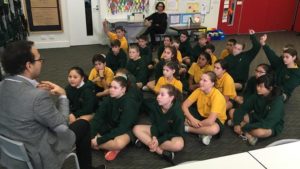
As discussed in Part 1 of this article, “Click Against Hate” was devised by the Anti-Defamation Commission (ADC) as an “early-intervention” program for Australian schoolchildren. I was recently forwarded a recording of a “Click Against Hate” session conducted by a Jewish activist named Brett Kaye (featured in the above photograph). At no point during the session does Kaye acknowledge that he represents the ADC, a Jewish activist organization. Instead he presents himself as a deeply moral and caring person who is involved in the program for purely humanitarian and altruistic reasons. In concealing his organizational affiliation, the children remain oblivious that “Click Against Hate” is not a politically neutral cyber-safety and anti-bullying program, but a carefully designed propaganda tool designed to serve Jewish ethnic interests in promoting “diversity,” “multiculturalism,” and the suppression of “hate” speech (i.e., speech professional Jews don’t like).
Kaye asks the children why they hate someone and they volunteer a variety of answers, such as jealousy and doing something bad to you. So he gives them a hint at what he is really after:
EXCERPT 1: “Psychologist time”
Brett Kaye: I’m gonna ask you a question that’s gonna help you: “Why would I hate somebody because of the color of their skin or because of their religion? Why would I hate somebody because the color of their skin or because of their religion? Why would I?
Child: Because of racism?
Brett Kaye: Yes. Why would I be racist?
Child: Because you were brought up not to like these people
Brett Kaye: AH! So my parents teach me how to be a racist. In other words, if I’m brought up in a racist household and therefore that could be my view too. Excellent answer.
Child: Wait, are you saying you were?
Brett Kaye: I’m not saying I was, but I’m saying based on what he said, what’s your name?
Child: James
Brett Kaye: Based on what James said, if somebody is brought up in racist household might they themselves become racist?
Child: Um maybe difference?
Brett Kaye: Difference. That’s an excellent answer too. Someone who is different to who I am: I don’t like people who are different, I don’t like their food, I don’t like the way they dress, I don’t like the way that they talk a funny language, they talk in an accent, and all of a sudden that difference can translate into hate. I don’t know about that. I’m ignorant about that. Nobody’s taught me about that. I’ve never learnt about that. Why are they doing all these funny things? Why are singing in this funny way? Why do they talk in this funny way? Why do they dress in this funny way? All that sort of stuff can lead to hatred. Have a look at my answers boys and girls and I think they’re close to yours: someone hurts you or someone you love (we got it), jealousy (Bam! Smacked it on the head), ignorance or lack of education, and what we learn at home.
Firstly, Kaye is not a psychologist. He is a teacher at a Jewish day school in Melbourne, a cantor at a synagogue, and an ADC activist. His opinions about the origins of “hate” are simply that, opinions. He uses leading questions to elicit his preferred responses from the children — a highly manipulative and unethical practice. He is evidently less interested in hearing about “hate” that arises in response to the actions of others because such hatred is eminently rational. Instead, he is keen to emphasize the irrational basis for hatred — with “anti-Semitism” doubtless being, in his mind, the paradigmatic example of such hate. Hostility to Jews is not a rational response to Jewish behavior that compromises the interests of non-Jews, but an irrational, phobic response to “difference.”
Kaye cites innocuous manifestations of difference, such as a “funny language” or unusual “food” or mode of “dress” rather than, say, the demographic displacement of Australian Whites, honor killings, female genital mutilation, demands for sharia law, epidemic rates of violent crime, or the mass rape of White women and children. He might also have mentioned how, as a result of the Jewish-led promotion of “difference” and “multiculturalism,” the Australian children he addresses are the first generation to grow up in a nation where regular Jihadist massacres (and the concomitant danger of being a victim) is now a normative part of their lives. White Australian children are today living in a situation they did not ask for, but which a generation of activists like Kaye (and traitorous politicians) have given them.
Recently concrete bollards, CCTV cameras and warning sirens were installed around Melbourne’s Central Business District in response to the heightened threat of terrorism that has accompanied the reckless importation of a rapidly expanding Muslim population.
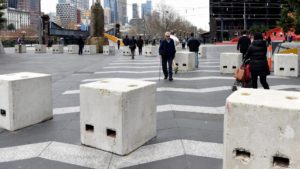
The concrete (pun intended) benefits of “diversity” and “multiculturalism” in Australia
The Australian Federal Police recently revealed they have “70-odd investigations” under way into terrorism cases going on around the country. The Premier of Victoria, Daniel Andrews informed his constituents in 2015 that “all of us, as Victorians and indeed Australians, have to accept that violent extremism is part of a contemporary Australia.” Last year his government introduced new laws in panicked response to an explosion in the number of carjackings and home invasions committed by young African and Pacific Islander males. For the first 228 years of the Australian nation’s existence such laws were unnecessary. Australia was a high-trust society founded on certain basic assumptions about human behavior. As a result of mass non-white (and particularly African, Pacific Islander and Middle Eastern) immigration, these assumptions no longer hold.
In the aftermath of recent terrorist attacks throughout the West (including in Australia) a horrifying realization has dawned on growing numbers of White people: their ruling elites regard no price (in murdered and maimed victims, or in the curtailment of civil liberties) as too high to pay for the supposed virtues of increased “diversity” and “multiculturalism.”
EXCERPT 2: “We cannot judge the whole group because of what a few people do”
Brett Kaye: Okay here’s the next word that I googled. Hard to see on this screen for some reason, but what religion do you think I googled when I pulled up that?
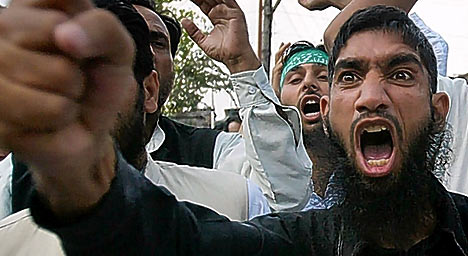
Brett Kaye: Muslim/Islam. So I put in Muslim and I put it in Google Images and that’s the first image that came up. Now, if I was a Martian coming from outer space what would I think about Muslim people based on that picture? That Muslim people are?
Child: A bit crazy?
Brett Kaye: Bit Crazy. …
Child: Weird.
Brett Kaye: Weird. Okay now, why do you think somebody put this image up of a Muslim person? What was the purpose? Why would they do that? What do they want me to feel? Whose hand haven’t I seen up for a while? How about you? What’s your name?
Child: Kiera
Brett Kaye: Kiera. Alright tell me, what do you think the person who put that up wanted me to feel about Muslim people?
Child: Maybe a bit scared.
Brett Kaye: Good. That’s exactly what they wanted me to feel. They wanted me to feel scared. In fact the word that we use to describe who do and say bad things about Muslim people is called Islamophobia. I’ll write it out because the screen is unclear. Cos Kiara said that she wanted they wanted me to feel scared. Phobia. Islamophobia is when I am scared of Muslim people because I don’t understand them, and therefore I say and do bad things against them. Now I taught at a beautiful school called ******** Primary School which was a Year 5 and 6 composite class and was sitting in a circle and a little girl put up her hand, her name was Fatima, and she told her own story. She said she was walking home from school with her little brother who was in Prep and all of a sudden some guy came up and swore at her, called her a Muslim and ‘c’ word, pushed her little brother over, and ran away, like a coward. So she was obviously devastated. Devastated. Crying. Her brother was on the floor crying, his books were everywhere and she said what made it even sadder was that people didn’t know what to do. They didn’t know how to react. Lots of people just pretended that never saw the man cross the street, they didn’t want to get involved. Bystanders. Some people came up and helped. But she said that most people just ignored or pretended they never saw. That was the one reason she was upset. The other reason she was upset was, from that moment onwards her parents wouldn’t allow her to go out by herself and her brother. Because they were scared, and you know it’s interesting, a lot of the Muslim schools where I teach at, they say that after a terrorist attack they get so scared because they’re worried that everybody thinks that all Muslim people are bad because of the acts of just a few. And unfortunately, those people who don’t understand or listen to stories, or maybe just read the newspapers, might believe that. You’ve got to make sure that you understand that you cannot judge a whole group of people because of the actions of a few. Ninety-nine percent of Muslim people, just like ninety-nine percent of Jewish people, or Hindu people, or Buddhist people are good. And we cannot judge the whole group because of what a few people do. That’s just being unfair. Yeah?
Child: Yeah but, at the same time, what a few people have done is bad…
Brett Kaye: It’s true. It’s true. That’s why we need to have discussions, we need to have these discussions. Because there are Muslim people who do the wrong thing. But that doesn’t mean that most Muslim people are bad. Because just a few people do the wrong thing. You’re right. And that’s why there is the perception, that why people do things bad, that’s we have to clear that up. It’s not fair. It’s not fair to all the Muslim people who are good people. It’s not fair. Horrible to live your life like that. Feeling that people don’t like you because of your religion. Or because of what a bunch of crazy people do overseas because they’re crazy. Yeah? That doesn’t represent Muslim people all over the world. It represents a bunch of crazy people who are out there doing crazy things. Who really don’t even know what it means to be a Muslim.
Child: Ah, but why do they believe in God? They think that because they think that…
Brett Kaye: They believe in a very warped idea of what it means to be a Muslim. That’s not the way that true Muslims behave. Most Muslim people that you will speak to totally disagree with the way in which these people live their lives. I don’t want to get into a big discussion about it now. All I want to say is, all I want to say, and it’s good that we’re talking about this, all I want to say, is that you cannot judge the actions of a few people and assume that everybody else is like that. Because it’s not true. It’s the same with everything, all types of people. How many other types of phobias guys? We’ve got Islamophobia. What other types of hatreds against groups of people are there?
Anyone who understands Muslims and their religion won’t fear them? Fear of Muslims has nothing to do with Islamic teachings and the actions of Muslims based on those teachings? “Islamophobia” is the result of a lack of understanding? Fundamentalist Muslims have a very warped idea of what it means to be a Muslim, and that’s not the way that true Muslims behave? These are dangerous lies peddled in furtherance of an ethnic agenda that is concealed from the children. Kaye is encouraging White Australian children to feel guilty about opposing a hostile outgroup that aims to establish Sharia law and all that means for women, democratic institutions, and civil liberties.
Exactly mirroring Kaye’s arguments, Melbourne’s Cultural-Marxist newspaper, The Age, in response to yet another deadly terrorist attack, this time by a Somali refugee, recently claimed that it was “dangerously false to see terrorism as an issue about Islam per se. It is about a miniscule minority of psychotic and psychopathic extremists and disenchanted, malleable young people.” It condemned those who “rail against immigration as a cause of terrorism, disquiet and cultural tension in Australia,” for engaging in “irresponsible scaremongering.”
The reality is that Jihadist violence and terrorism don’t originate from “a bunch of crazy people” who “don’t even know what it means to be Muslim.” It doesn’t even originate from the interpretation, let alone the extremist interpretation of the Islamic texts, but from an accurate reading by all practicing Muslims. It’s clear from reading the life of Mohammed and the Koran that killing infidels is justified because it is commanded by Allah against all those who don’t submit to Islam. The clearly-stated long-term goal is the establishment of a global caliphate. Any atrocity committed in pursuit of this aim is justifiable and only makes a martyr of the perpetrator. Those who, like Kaye, disingenuously claim that terrorists are simply “crazy people” doing “crazy things” fail to explain why this particular variety of insanity is almost exclusively confined to adherents of one religion.
For Kaye, the real shame of the (now regular) Islamic terrorist attacks in the West is, not so much the murdered victims and their families, whose lives have been destroyed, but the Muslims who live in fear of a backlash following these attacks. In response to terrorist atrocities, it is, he contends, only ignorant “Islamophobes” who “don’t understand or listen to stories, or maybe just read the newspapers” who think it’s reasonable “to judge a whole group by the actions of a few.”
Kaye conveniently ignores findings like those from a 2016 survey in the UK that found that 100,000 British Muslims sympathize with suicide bombers and people who commit terrorist attacks. It also found that two-thirds of British Muslims (66%) would not contact the police if they believed somebody close to them was involved with jihadists. A third of British Muslims think that polygamy should be legalized in Britain, and the same percentage refuse to condemn the stoning of women for adultery. The survey found that half of British Muslims believe homosexuality should be a criminal offence — which should ostensibly alarm the representative of an organization supposedly committed to opposing “homophobia.” A 2016 survey of French Muslims found that 28 per cent hold extremist views and reject secular French law. The evidence clearly shows that Kaye’s assertion that “ninety-nine percent of Muslims are good [i.e. non-threatening]” is a dangerous lie.
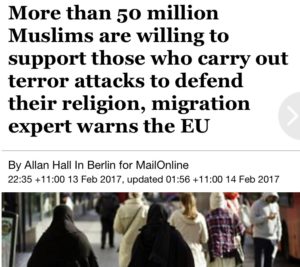
“Ninety-nine per cent of Muslims are good” — Brett Kaye
A direct result of the Jewish-led push for greater racial and religious diversity in Australia is that juvenile justice facilities have now reached the point where a specialist facility is needed to manage Islamic extremist inmates. The general secretary of the Public Service Association recently observed that “Radicalisation is not restricted to adults in the NSW prison system. My members at the juvenile justice system at Cobham have to deal with radicalized young people who openly speak about waiting for an opportunity to behead someone.” Given this reality, it’s not surprising that a survey in April found that four out of five Victorians distrust Muslims.
Organized Jewry in Australia is more than Happy to Generalize About Others
Kaye’s proposition that we cannot make negative generalizations about Muslims because it’s “not fair” is belied by the words and actions of the ADC itself. Despite supporting mass non-White immigration and multiculturalism for Australia, this organization, contrary to the rhetoric it espouses for non-Jews, knows that Muslims are a potential deadly threat that need constant and careful monitoring. The former ADC executive director, Deborah Stone, in discussing the organization’s “Anti-Semitism Prevention Project” explained how:
Australia’s Muslim population is growing and is more than triple that of the Jewish community. Most Australian Muslims are committed to multiculturalism but there is evidence of pockets of isolationism and sympathy towards extremist ideologies. The growth of the extremist Hizb-ut-Tahrir is an example. We need to monitor the Australian Muslim community to ensure we understand its plurality of positions, build bridges with moderates and counter fundamentalism in its earliest stages before it becomes a physical threat to our community.
So, while instructing innocent Australian schoolchildren to “be fair” to Muslims because ninety-nine per cent of them are “good,” the ADC is busy monitoring the entire Australian Muslim community to prevent it from becoming “a physical threat to our community.” Despite a survey last year showing half of all Australians oppose any Islamic immigration, the ADC (which happily endorses this policy for Israel), is active in schools encouraging the next generation to swallow this poison.
White Australian schoolchildren are instructed by Jewish activists like Kaye to refrain from engaging in pattern-recognition and drawing of logical inferences because it “isn’t fair.” Don’t conclude that Africans are far more likely to be violent offenders despite statistics showing they are 44 times more likely to break the law and 70 times more likely to commit a home invasion than Australians. The Australian recently reported the comments of Victorian Police Deputy Commissioner, Stephen Leane, who told a state inquiry into youth justice centers that African and Pacific Islander teenagers were “part of the angriest cohort of offenders police had seen, who started out with some of the most violent crimes rather than progressing from misdemeanours.” In response to an epidemic of violent crime committed by African refugees, columnist Andrew Bolt noted Australia’s refugee policy was “a crime against Australians,” observing that “the level and severity of crime by African refugees and their children is astonishing and an indictment of our refugee policies.”
To conclude on the basis of the evidence that Middle Eastern and African migrants and refugees are undesirable is, according to the ADC, “unfair” and morally reprehensible. Australia’s first dedicated refugee policy arose in late 1970’s in direct response to lobbying by the Jewish activist and pioneering multiculturalist Walter Lippmann (see my “The War on White Australia: A Case Study in the Culture of Critique, Part 3 of 5”).
In the decades since, organized Jewry has remained at the forefront of those pushing for increased refugee numbers. Bolt notes how it was this policy that
opened our gates to Muslim Lebanese families fleeing the Lebanese civil war — families who formed the nucleus of a community that’s provided more than half the Muslim terrorists jailed here. We also stepped up a refugee program that gave us the men who perpetrated the last three [now four] Islamist terrorist attacks here. … This refugee program also imported the Sudanese community that Victorian police statistics show is now 128 times more likely per person to commit aggravated robberies than other Victorians. To make this disaster worse, we trashed our own history and symbols while running multicultural policies that paid the least assimilated immigrants to stay that way.
A by-product of the mass-importation of low-IQ migrants and refugees is declining educational standards in Australia. The OECD expressed alarm at the nation’s educational slide. The Sydney Morning Herald observed that “Where once Australia kept up with South Korea, now our east Asian neighbors are streaking ahead on tests that compare the academic ability of 15-year-olds around the world. Students from Poland and Vietnam are now outperforming Australia’s teenagers. … The warning signs have been there for over a decade. Australia’s PISA results have been on the slide since 2003.” Academics have scrambled for reasons (other than the obvious fact of the changing racial make-up of the student body) to account for this sudden decline. Some ascribe the decline to inadequate resourcing of schools — despite the fact that government funding of education in Australia is at an all-time high. A Victoria University report found the increasing number of students who drop out of education “are costing taxpayers a staggering $18.8 billion by increasing crime, clogging health services, relying on welfare and reducing tax revenue.”
Of course, unlike working class Whites, Jews in Australia are totally exempt from dealing with the pernicious daily consequences of the decades-long social engineering of their community leaders. Australia’s wealthiest ethnic group can avoid having their children’s education sabotaged by low-IQ, disruptive Africans and Muslims by utilizing their extensive network of lavishly resourced (and ethnically homogeneous) Jewish day-schools. Jewish columnist Kerri Sackville recently noted how she was “thrilled” with the education her children receive at a Jewish school, where “they learn the meaning of each Jewish festival, they learn to sight read Hebrew, and they learn the history of the Holocaust and the Jewish people.” For her, Jewish schools are of vital importance in helping Jews to “maintain their sense of community, their understanding of their religion, and their cultural heritage.” White Australian children today have no corresponding right.
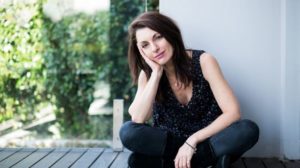
Kerri Sackville: “thrilled” by her children’s Jewish education
Despite their injunctions to the children to be non-judgmental about particular racial and religious groups, Jewish activists like Kaye routinely generalize about non-Jewish outgroups. Despite the fact that White Australians had absolutely nothing to do with “the Holocaust” (indeed thousands of Australians died fighting Germany in World War II) this is constantly invoked as sufficient justification for the transformation of Australian society through non-White immigration and multiculturalism. Kaye asserts that it’s “unfair to judge an entire people by the actions of a few,” and yet the central notion underpinning organized Jewry’s activism in Australia (and throughout the West) is the generalization that all White people are potential Nazis and, consequently, homogeneously White societies are dangerous for Jews and must be deconstructed.
The one-time editorial committee member of the Australian Jewish Democrat, Miriam Faine, got right to the heart of Jewish support for large-scale non-White immigration and multiculturalism when she noted that: “The strengthening of multicultural or diverse Australia is also our most effective insurance policy against anti-Semitism. The day Australia has a Chinese Australian Governor General I would be more confident of my freedom to live as a Jewish Australian.”[i] Comments like these, which echo those of Barbara Roche in the UK, and Barbara Lerner-Specter in Sweden, make it clear that Jewish promotion of non-White immigration and multiculturalism is, first and foremost, a form or ethnic strategizing (or ethnic warfare) concerned with preventing the development of a mass movement of anti-Semitism in Australia and other Western societies.
In Kaye’s duplicitous injunction to the children to treat everyone as individuals (rather than collectives) we hear echoes of the Frankfurt School’s promotion of radical individualism as the epitome of psychological health for Europeans. The sane and well-adjusted White person was characterized by these Jewish intellectual activists as an individual who had broken free from the traditional Western shaming code, and who realized their human potential without relying on membership in collectivist groups. This promotion of radical individualism among non-Jews was, of course, intended to undermine the group cohesion of Europeans and thereby weaken their capacity to compete with Jews. The defining feature of Jewish history has been that group interests, rather than individual interests, have been of primary importance. Judaism is the prime historical example of how the rejection of individualism (especially in the sociobiological niche of the Diaspora) leads to group evolutionary success (i.e. genetic continuity across millennia).
The uncomprehending veteran political journalist for The Australian, Paul Kelly, recently opined that the “risk for liberals” in “pushing the limits of multiculturalism” is that “in the process they weaken the overall sense of a bonded community with shared values.” This outcome is, for the Jews who have spearheaded multiculturalism in Australia, not an unforeseen and lamentable by-product of an otherwise benevolent policy, but its central objective. Radical individualism renders formerly White societies defenseless against collectivist strategies like those pursued by Jews.
[i] Quoted in Kevin MacDonald, The Culture of Critique: An Evolutionary Analysis of Jewish Involvement in Twentieth‑Century Intellectual and Political Movements, (Westport, CT: Praeger, Revised Paperback edition, 2001), 303.





Comments are closed.